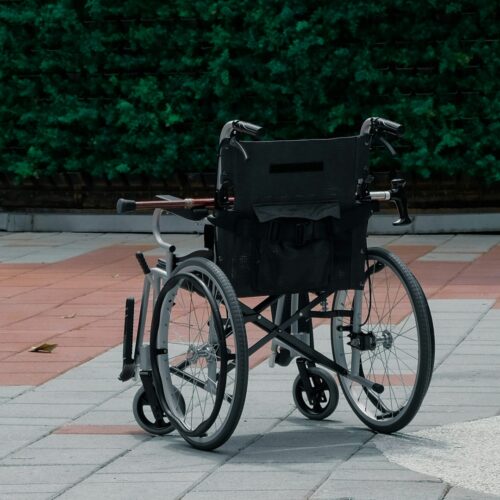For many, it’s a time to explore new horizons, reconnect with loved ones, and create cherished memories in the shining sun.
While the prospect of a summer holiday is exciting, individuals living with a spinal cord injury (SCI) face unique considerations that require careful planning. From managing the physiological impacts of warmer temperatures to navigating intricate logistics, particularly when travelling with children, these factors can present significant challenges.
This article serves as your essential guide, offering practical spinal cord injury travel tips while highlighting accessible destinations designed to ensure your summer escape is not only smooth and enjoyable but also one to remember. We’ll also share details about Aspire Law’s unmatched expertise when it comes to spinal cord injuries and SCI compensation claims.
Understanding and overcoming summer travel challenges with SCI
Embarking on a summer holiday with a spinal cord injury requires a proactive approach to potential challenges. Understanding these hurdles beforehand allows for effective planning, transforming potential obstacles into manageable aspects of your journey.
Managing heat and thermoregulation
One of the primary concerns during summer travel for individuals with SCI is managing body temperature. Due to damage to the autonomic nervous system, many people with SCI experience impaired thermoregulation, making them more susceptible to overheating.
Crucial strategies for staying cool include maintaining adequate hydration by drinking plenty of fluids, choosing lightweight and breathable clothing, consistently seeking shade during peak sun hours, and utilising cooling aids such as cooling vests, spray bottles, or damp towels.
Streamlining travel logistics
Travel logistics can often feel daunting, but meticulous planning can significantly ease the process. This begins with the importance of meticulous packing, ensuring all essential medications are readily accessible, adaptive equipment is well-maintained and packed securely, and personal care items are organised for easy accessibility.
From navigating bustling airports to public transport systems abroad, advance planning and pre-booking play a crucial role not only for your safety, but for your peace of mind.
Travelling with young family members
For those travelling with young family members, additional considerations are vital to ensuring a comfortable and enjoyable experience for everyone. This includes planning activities that cater to all ages and mobility levels, ensuring children are aware of and can assist with any specific needs, and maintaining a flexible itinerary.
Tips for keeping children engaged and safe throughout the journey might involve packing favourite toys, planning regular breaks, and utilising accessible play areas or attractions.
Get medically prepared
Comprehensive medical preparedness is a cornerstone of safe and stress-free travel. This involves assembling vital medical documents, including prescriptions for all necessary medications, a list of emergency contacts, and medical notes detailing your SCI and any specific requirements.
While nobody wants to pre-empt a negative travelling experience, it’s crucial to be prepared. Understanding and preparing for potential SCI-specific complications, such as autonomic dysreflexia, pressure sores, and effective bladder and bowel management, by having the necessary supplies and knowledge, will help you manage any unforeseen circumstances confidently.
Essential tips and tricks for accessible summer travel
With a clear understanding of potential challenges, the next step is to equip yourself with practical strategies. These spinal cord injury travel tips are designed to empower you, transforming the complexities of travel with SCI into a seamless and enjoyable experience.
Carry out accessibility research
When planning your accessible summer holiday, thorough research is incredibly important. This involves diligently verifying the specific accessibility features of hotels, attractions, and various modes of transportation to ensure they meet your individual needs.
Crucially, direct communication with venues is highly recommended to confirm these specific requirements and avoid any unwelcome surprises upon arrival.
Crucial medical planning
Before setting off on your adventures, it’s important to discuss your travel plans comprehensively with your healthcare team. This ensures you obtain all necessary prescriptions, medical notes, and tailored advice for effectively managing your SCI-related conditions while abroad.
Secure comprehensive travel insurance
Securing specialised travel insurance is non-negotiable for peace of mind. This vital coverage should adequately protect against unforeseen medical emergencies and potential damage or loss of essential adaptive equipment.
Get smart with packing for SCI
As you start planning your summer holiday, create a detailed checklist for all adaptive equipment, including spare parts and repair kits, alongside medications and personal hygiene items. Always prioritise packing essential items in your carry-on luggage for easy access while on the go.
Mastering air travel: Addressing “can you fly with a spinal cord injury?”
Yes, absolutely, you can fly with a spinal cord injury. However, to ensure a smooth and stress-free journey, thorough preparation and understanding of airline procedures are essential.
Here are our top spinal cord injury travel tips for when your travel plans mean conquering flying, airport security, and transfers.
Get to grips with airline policies
It is crucial to notify airlines well in advance about your SCI and any specific assistance you require, such as transfers or seating. Familiarise yourself with their regulations concerning power and manual wheelchairs, particularly battery types, to ensure a smooth check-in process.
But it’s not just about managing expectations when it comes to flying itself. Efficiently managing security procedures with adaptive equipment requires prior knowledge of protocols. Be sure to spend some time liaising with the dedicated assistance services available at airports for seamless navigation, boarding, and deplaning.
Find comfort in-flight
Plan strategies for transfers to aisle chairs and aircraft seats to maximise comfort during the flight. Remember to manage personal care needs and take proactive steps, such as regular pressure reliefs, to prevent pressure sores and promote circulation on longer journeys.
Plan transfers for a seamless travel experience
Research and pre-book accessible taxis, vans, or public transport options at your destination to ensure reliable mobility. For greater independence, consider renting an accessible vehicle, and familiarise yourself with the accessibility features of local trains and buses.
Find fun in excursion planning
Just because you have a spinal cord injury, it doesn’t mean you have to miss out when it comes to planning excursions during your trip. Identify accessible attractions, museums, and tours at your chosen destination well in advance.
Explore opportunities for engaging in adaptive sports and outdoor recreation, such as accessible hiking trails or handcycling, to make your holiday experience an unforgettable one.
Ideal accessible destinations for summer holidays
Choosing the right destination is key to an enjoyable and accessible summer holiday.
Here, we highlight various types of destinations that often excel in providing accessible experiences.
Accessible beach destinations
For those dreaming of sun, sand, and sea, numerous coastal locations offer great accessibility. These destinations boast features like accessible boardwalks, readily available beach wheelchairs, and adapted facilities to ensure safe and enjoyable water access.
Example: Barcelona, Spain (numerous accessible beaches like Nova Icaria, equipped with accessible pathways and services).
Accessible city breaks
Urban environments can be incredibly rewarding for accessible travel, provided they are well-equipped. Look for cities renowned for excellent accessible public transport, flat terrain, and a wealth of accessible cultural attractions.
Example: Amsterdam, Netherlands (flat terrain, extensive canal system with accessible boat tours, and many accessible museums).
Nature and adaptive adventure
If your ideal holiday involves the great outdoors, many national parks and resorts are increasingly offering adaptive adventure opportunities. These locations provide accessible trails, fishing spots, or dedicated adaptive sports centres, allowing you to connect with nature.
Example: Colorado, USA (many national parks offer accessible trails and adaptive sports organisations provide opportunities for handcycling, rafting, and more).
Accessible cruise holidays
Cruising offers a convenient and often highly accessible way to explore multiple destinations without the constant packing, unpacking, flights and transfers. Modern cruise ships are designed with extensive accessibility features, providing a comfortable and convenient travel experience.
Example: Caribbean Cruises (many major cruise lines, such as Royal Caribbean, offer highly accessible ships and provide accessible excursions at various ports of call).
Beyond these categories, a number of established, specialised travel companies worldwide offer tailored packages and experiences specifically designed for individuals with spinal cord injuries, providing a valuable resource for accessible travel planning. Here are a few worth exploring:
Your journey awaits: overcoming SCI travel barriers
Don’t let spinal cord injury hold you back. Trust us when we say that, although at times daunting, travel with SCI is completely worth it. Travel is life-changing, perspective-shifting and soul-nourishing. Don’t let your injury stop you from experiencing the world in all its glory.
Aspire Law is a specialist law firm working for people with SCI. Our team is dedicated to providing information and support for everyone affected by spinal cord injury, from advice on travelling with spinal cord injury and tips, to legal help when you need it.
For information and spinal cord injury legal advice, get in touch: give us a call on 0800 030 20 40.



